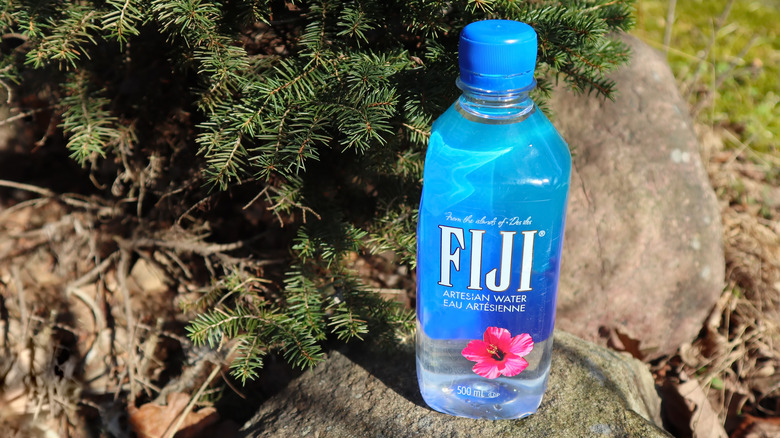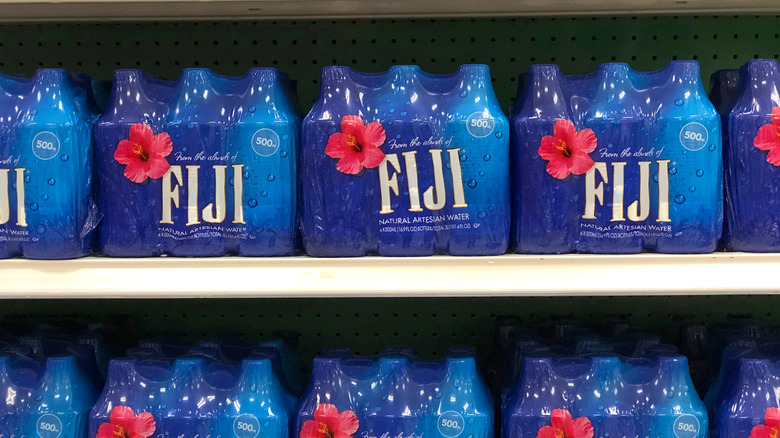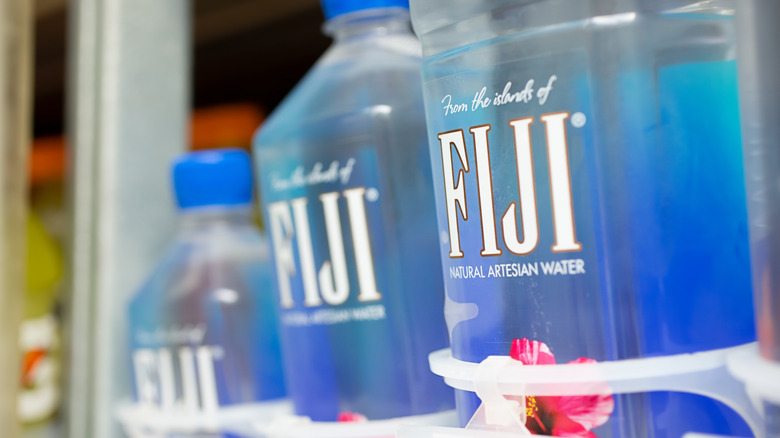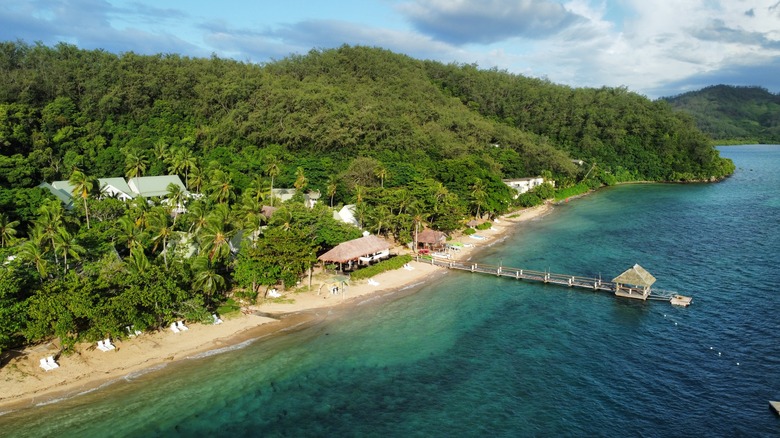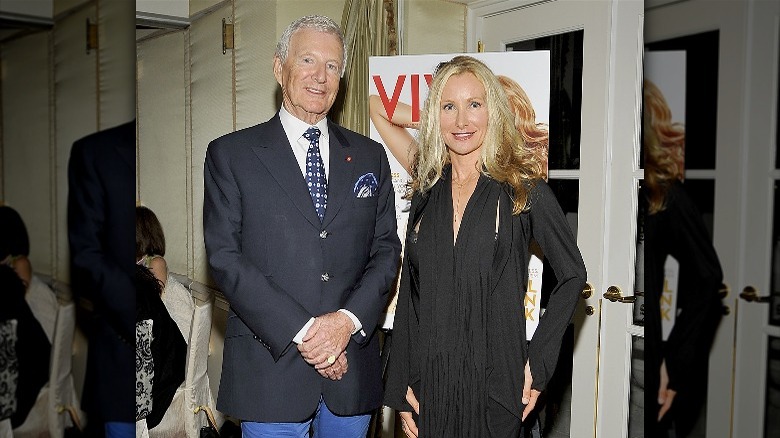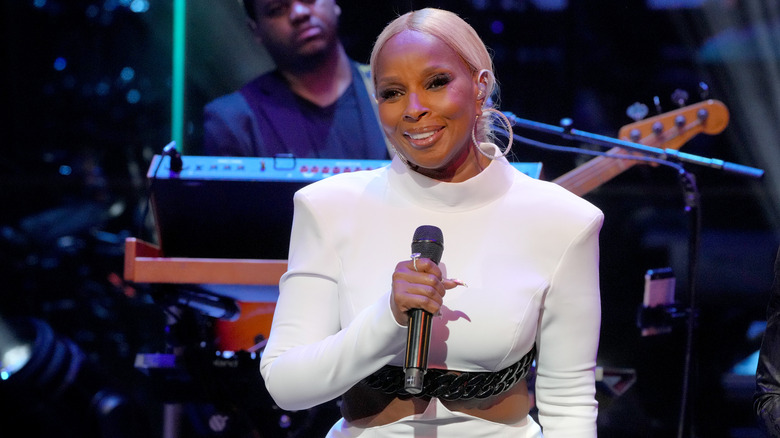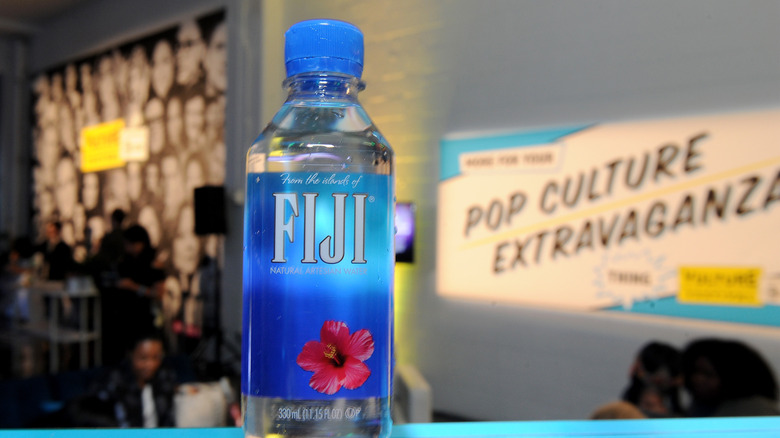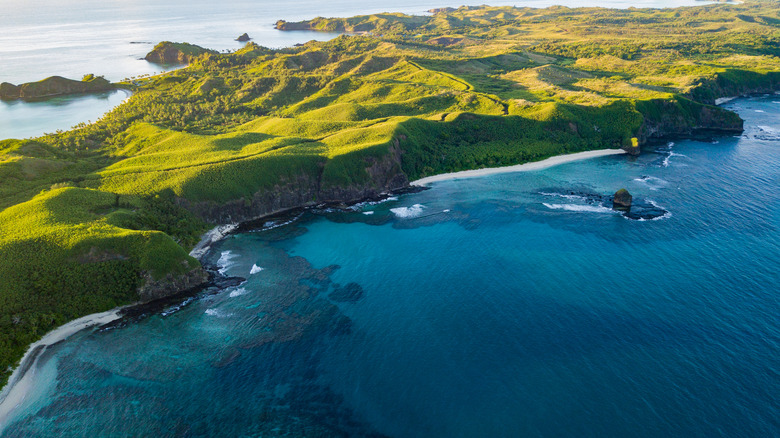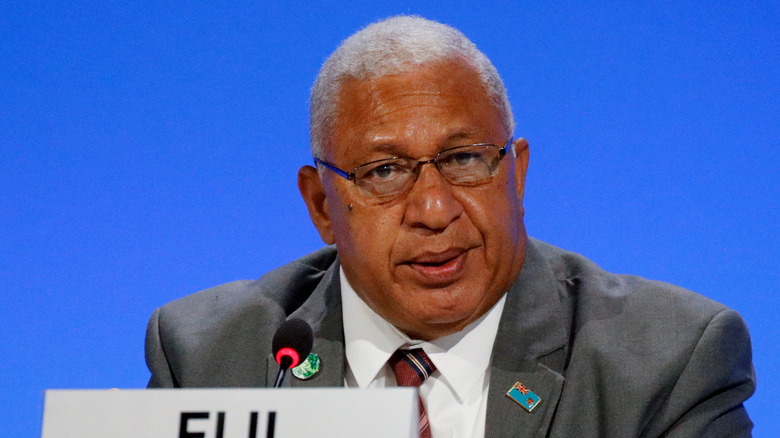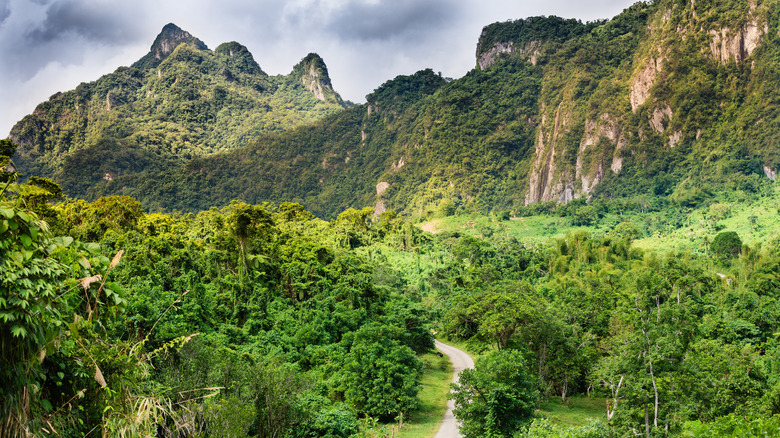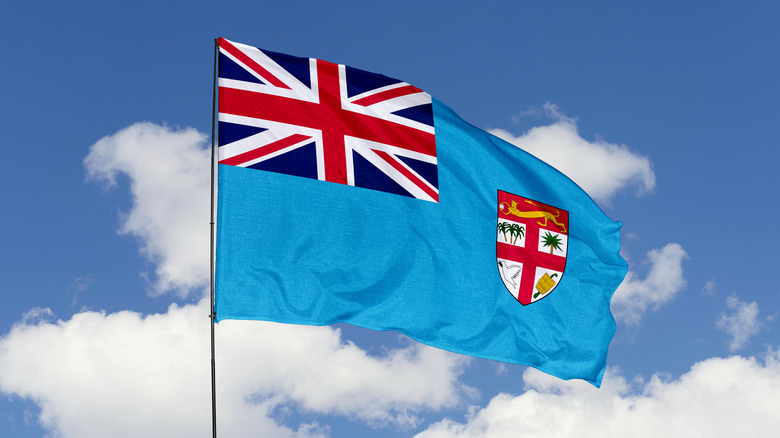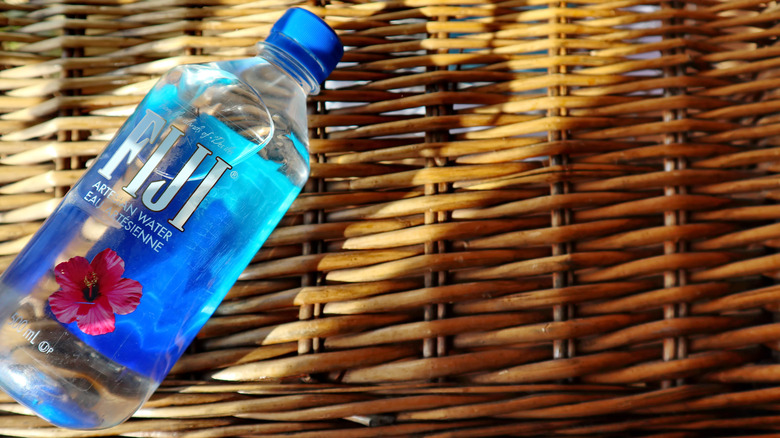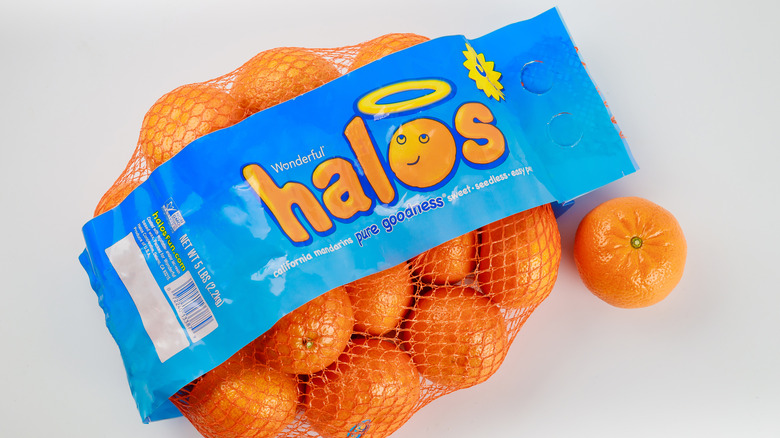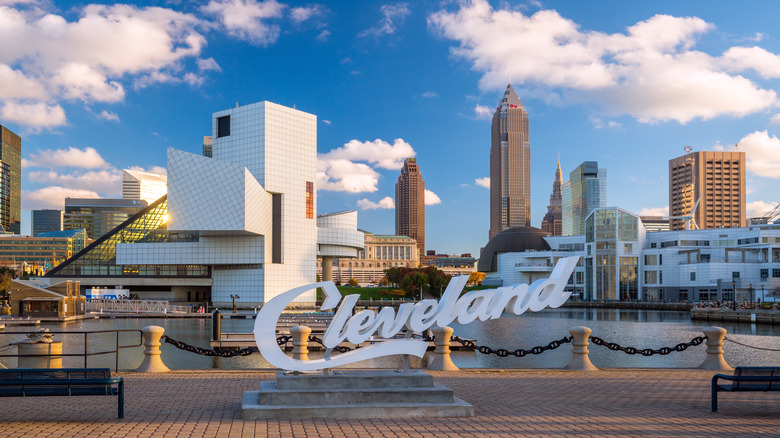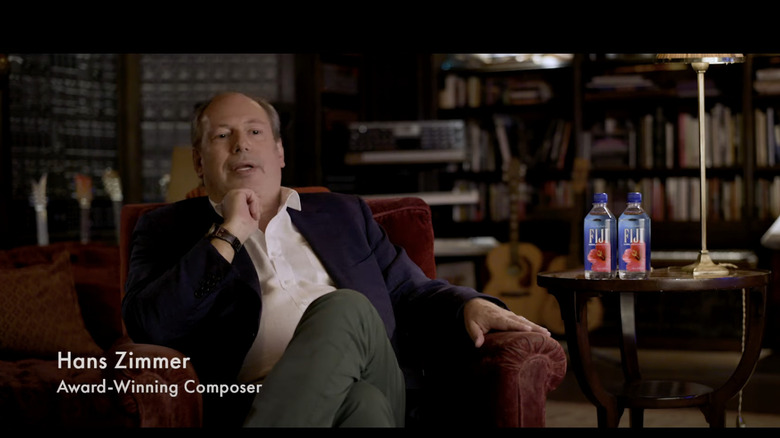The Truth About Fiji Water
"It begins as a cloud." So starts the life cycle of one of the world's leading bottled water brands, Fiji Water. Founded by a Canadian businessman in 1996, the artesian water supplied by an underground reservoir on the Fijian island Viti Levu tapped into an expanding market of prestige beverages (via Mother Jones). It bypassed Evian for imported H2O in America and remains a status symbol among celebrities from movie stars and models to American presidents. Per BizVibe, it is one of the top water brands in the world and flows globally throughout Canada, Australia, Spain, and Germany (via eTurboNews).
Paying big bucks for something as basic as water isn't surprising when the marketing surrounding Fiji Water is so attractive. Water extracted out of a volcano certainly evokes environmental purity. And yet, this narrative only gives a glimpse of the actual story driving its success. Fiji Water has been involved in a number of scandals since its inception decades ago. Some of the scandals directly conflict with the brand's natural, healthy image. These findings include disregard for the environment, shady business decisions, and cynical political maneuvering. The untold truth of Fiji Water is finally here, so join us as we explore the murky terrain of a controversial company.
Fiji Water was tax-exempt
Any business, no matter how profitable, has a responsibility to pay taxes unless it wants an unpleasant visit from the taxman. For quite some time, the rules didn't apply to Fiji Water. It claimed tax-exempt status from the very first drop of water tapped for production. As Mother Jones reported in 2009, the company evaded tariffs of any kind from Fiji's government on the grounds that the bottled water business was a precarious undertaking, an industry that didn't leave much room for failure. It's a convincing argument, and it stuck for an entire decade. This was far longer than what the initial agreement called for, as the exemption was supposed to end altogether by 2008.
Eventually, its tax-free status ended when the Fijian government imposed new regulations on bottled water companies in 2010, but only after some resistance that we'll cover later on. In total, Fiji Water paid 764,000 Fiji dollars, or roughly $431,000 in U.S. currency, in water taxes (per IRC). From the get-go, Fiji Water was not being bound by the same laws other businesses have to follow.
The company trademarked the name 'Fiji'
Trademarking a symbol or phrase only makes sense when its association can't be debated — think the iconic Nike swoosh or Paris Hilton's catchphrase "That's Hot" (via CNN). But trademarking the name of a country? That takes some nerve. Apparently, Fiji Water's not afraid of testing the limits of intellectual property, because it's actually trademarked the word "Fiji," albeit only the stylized, capitalized version that's printed on the bottle. Additionally, the design of its distinctive square bottle also has a patent (per NPR). We suppose it's one thing to legally claim credit for unique packaging, but how much credit can Fiji Water take for the name of the island nation keeping its business alive?
A big corporation lording over the little guys is nothing new of course, but Fiji Water's taken it to new extremes. Because of the registered trademark, Fijian citizens have become entangled in legal troubles for printing the word on bottled waters they've produced themselves. As Mohammed Altaaf told Mother Jones, who experienced legal pushback after including "Fiji" in his brand name,"It's just like branding a water America Water and denying anyone else the right to use the name 'America.'"
Fiji Water is the country's biggest export
Fiji Water propelled the island nation to international stardom upon making its way across the globe in the late 1990s. Subsequently, it led to mineral water becoming the country's top export, a title it's held comfortably ever since. According to the CIA World Factbook, bottled water is Fiji's largest export.
Prior to the rise of H2O, Fiji's biggest industry was sugar, which encountered a massive boost in the mid-20th century with the government-run Fiji Sugar Corporation, as well as special trade deals with the European Union (via Britannica). Factors like new pricing regulations and emerging industries impacted sugar's long-term success. The Fiji water company quickly became a crucial part of the country's economy. Considering the company reaps $43 million in revenue every year according to Zippia, it isn't shocking to discover the little square bottle could form the economic backbone of an entire country.
The founder's ties to the nation of Fiji go beyond bottled water
Fiji Water's founder is David Gilmour, a Canadian business tycoon who's worn many hats over the course of his career in the tourism sphere — some of his most notable pursuits are in the field of real estate and gold mining, per Forbes. Obviously, Fiji Water made him a household name, but the bottled beverage was not his first rodeo with the Republic of Fiji. In fact, his relationship with the South Pacific island goes back decades and involves the field he seems to thrive in the most: the hospitality industry.
Back before Fiji Water was tapped from volcanic rock below the Earth, Gilmour established a chain of hotels in the late 1960s called the Southern Pacific Hotel Corporation. He launched the venture with his business partner Peter Munk and garnered generous funding from investors to bring the resort to life, including powerful elites like Saudi princes (via Mother Jones). Mother Jones also confirmed that the enterprise enjoyed prominence in the region, including a particularly extravagant location on the island of Fiji itself. But Gilmour's investments in Fiji aren't just limited to the business world. He actually owns an island on Fiji called Wakaya, according to Forbes.
Celebrities and presidents are fans of Fiji Water
Celebrities endorse a variety of products, from makeup and shoes to the latest cryptocurrency. But thanks to Fiji Water, we can now add fancy bottled water to the list of things the rich and famous love. The brand's prestige image wouldn't be the same without the enthusiastic cult of A-List followers, which features famous faces from TV, movies, music, and of course politics. Oprah Winfrey, Justin Timberlake, Nicole Kidman, and Barack Obama are on the record of sipping from the square bottle per Paper Magazine. Fiji's high price may contribute to its position as a luxury product loved by celebs.
One star who's exceptionally infatuated with the tropical import is Mary J. Blige, and a tour rider from 2006 showed exactly how far the R&B musician's dedication went in obtaining her favorite beverage (per The Smoking Gun). For starters, she specifically requested Fiji Water over the bottomless selection of bottled water brands. Under the extensive list of demands for her dressing room, one was to provide "12 large bottles 1.5 liters of water." Fair enough. Everyone needs to hydrate, especially talented singers like Mary J. who need to keep their vocal cords in check before the big show. The catch? It had to be Fiji Water.
It eschews traditional advertising
Ever noticed how Fiji Water doesn't seem to do much advertising? Not many TV commercials, no radio jingles that get stuck in your brain like glue. It's strange for a global brand of its size not to embrace the high-energy marketing that capitalism demands, but that's because there's a different strategy at play. Part of Fiji Water's luxe, upscale reputation comes from opting for product placement in lieu of classic advertisements. As Martin Roll reveals, the water's been featured in a slew of movies and TV shows, finding its way onto movie sets and award shows as a result of David Gilmour's close industry ties. Famous cameos include "The Sopranos," "Brothers and Sisters," and movies like "The Thomas Crown Affair," though the viral-friendly Fiji Water Girl at 2019's Golden Globes undoubtedly deserves an honorable mention (via The Cut).
As Forbes mentions, David Gilmour apparently didn't want to sink a ton of cash into mainstream ads, which explains Fiji Water's noticeable absence from television screens and car radios (although in recent years, the brand has made a limited amount of more traditional commercials). It's undeniable that eschewing traditional methods makes it more exclusive and more covetable. Seeing a famous fashion designer taking a swig of it on the Red Carpet is probably more effective than a random advertisement tucked inside a newspaper, and it's shown to be a winning strategy for maintaining the brand's intrigue.
Manufacturing Fiji Water is harmful to the environment
Bottled water has become a hot-button issue for environmentalists regarding waste, and as Mother Jones demonstrates, the concern is well-founded. Manufacturing Fiji Water uses up a ton of resources that impact Mother Nature for the worst, whether it's the electricity powering its bottling plant or the mountains of plastic shipped all the way from China to make its packaging. As Fast Company noted in 2007, the facility that extracted and bottled Fiji Water ran on a steady flow of diesel fuel from three generators chugging along for 24 hours a day. Startling fossil fuel emissions and profuse amounts of synthetic materials are far from the Garden of Eden-esque narrative the brand proudly promotes.
If you're not convinced drinking an occasional bottled water negatively impacts the environment, consider the energy that goes into getting a single bottle of Fiji Water on your supermarket shelf — 1.75 gallons of water, according to Vox, plus its journey around the world by ship (via Fast Company). Multiply that by a million, which is the average batch transported out of its factory on a daily basis, and you've got yourself a very large carbon footprint. Fiji Water has promised to commit to sustainability, including using recycled plastic for its bottles, but it's unclear how much of a difference the changes will make on the company's overall environmental footprint.
It's been accused of profiting off political unrest
Military dictatorships are the last thing we would associate with bottled water. Yet Fiji Water is no ordinary bottled water company. Fiji Water's faced accusations of profiting during a moment of mass political upheaval in Fiji. In 2006, the country was thrown into disarray when Commodore Frank Bainimarama successfully overthrew the government, executing the fourth military coup Fiji has had since the 1980s (via RNZ). Right from the start, the new regime went to work dismantling outlets for public dissent, including newspapers and other sources of media, according to Mother Jones.
An alarming event by any measure, this apparently didn't dissuade Fiji Water. Instead of halting production at its bottling plant in the Yaqara Valley, the bottled water enterprise continued chugging along and did not comment on the coup, prompting outrage and concern over its ethics (via The New University). Certainly, some might argue that businesses aren't obligated to speak out about politics. But it's different when it's a company with international stature like Fiji Water. The writer from The New University argues that staying silent while a military regime guts the top branches of government and free expression could be read as tacit support for the coup, or at least a lack of concern for the country Fiji Water extracts its product from.
Fiji Water has a lease on its aquifer
Fiji Water is extracted from an underground reservoir on Viti Levu, an image its website is fond of romanticizing. A natural resource like water should be free-flowing and readily available, at least in theory. But technically, the company does not access this grand reserve for free. On the contrary, it turns out Fiji Water leases out the land where the aquifer is located. At the time of launching the bottled water brand in the mid 1990s, David Gilmour set up a 99-year agreement establishing access to its 400-foot-deep enclave. This makes the company the prime benefactor of the aquifer, while the rest of the country struggles to obtain water from the source. The underfunded Fijian government has not been able to set up the infrastructure to distribute the water to its citizens (via Mother Jones).
Water, like the air we breathe, is essential to being human. The United Nations even recognizes clean water as a human right, per Vox. Fiji Water is touted as a drink from an untouched wilderness environment that quenches the thirst ingrained in our need for survival. It's also untouched by the Fijian people who are unable to access the very water that's fed the economy and made Fiji Water a rich company.
Despite booming business, not all Fijian citizens benefit
It's safe to say that with $43 million made every year per Zippia, Fiji Water is a prosperous business, both in Fiji and the world over. Yet raking in the dough doesn't necessarily translate to spreading that wealth to others. The majority of Fijian people don't enjoy the spoils brought by Fiji Water. Around 12% of the total population lacks a reliable source to clean drinking water via The New University, and crumbling infrastructure, namely eroded drain pipes, has led to public health crises including lethal typhoid outbreaks (per Vox).
Fiji Water likes to highlight its investment in local communities as a way of saying it gives back. The Fiji Water Foundation, for example, provides funding for eligible schools across the island in the form of teaching grants for classroom necessities. This remains true to an extent, as the array of charitable causes on its website shows. The company also employs many Fijians and brings money to the country's economy, as NPR points out. Nevertheless, Fiji Water's business model is predicated on exporting a natural resource that the Fijian people need in order to survive.
It closed its factory in response to a tax hike
Paying virtually no taxes for the first decade-plus of its existence was a boon for Fiji Water's growth. It wouldn't be the beverage empire it is today without this exemption. That time did come to an end, however, when the Fijian government issued a new rule on bottled water businesses. Under the revised water extraction tax via IRC, companies would be charged 15 cents for each liter of water if their monthly output went over 3.5 million liters. Fiji Water was only paying one-third of a cent at the time and found itself the only corporation standing to be charged that amount. Outraged by the perceived slight, it decided to shut down its factory in protest and laid off all the employees in the process, threatening to pull out of the country altogether (per NPR).
While the stand-off only lasted a day, and its workers got their jobs back, Fiji Water's strong-arm tactics — and willingness to throw its labor force under the bus — leaves a sour taste in the mouth no artesian water can wash away.
Fiji Water has been taken to court over false advertising
Companies that portray an eco-friendly image without delivering on substantial promises are committing what's called "greenwashing." Fiji Water's been criticized for this practice, to the point that it's faced legal trouble for it. In 2011, a California woman sued the company for falsely perpetuating the claim that its products were "carbon-negative," when reality showed otherwise. Per GreenBiz, the issue originated from Fiji Water's 2007 pledge to reduce carbon emissions by 120% through an extensive conservation program that included planting trees across 2,000 acres of the South Pacific region.
The problem was that Fiji Water wasn't "carbon-negative." Instead, it was allegedly going off of future numbers in a system known as forward crediting (via Mother Jones), because Fiji Water's goals wouldn't actually be seen until far later in the future (2037 at the soonest, per Vox). Essentially, Fiji Water was prematurely claiming credit for an outcome that hadn't occurred and marketing the water to reflect that, manipulating people's trust to sell a higher-priced product. The company's current sustainability page does not mention its past carbon-negative promise.
Fiji Water's current owners also own Pom Wonderful and Halos Mandarins
David Gilmour is no longer Fiji's head honcho. Per Mother Jones, he sold the brand back in 2004 to Lynda and Stewart Resnick, a California-based power couple with a lot of clout in the agricultural industry. The Wonderful Company, the conglomerate they launched in 1979, is where Fiji Water and a slew of other brands with a health-conscious angle reside. Some of these you're probably familiar with already: Halos mandarin oranges, Wonderful Pistachios & Almonds, and Pom Wonderful, the pomegranate beverage that took the fruit world — and the creative limits of beverage packaging — by storm.
Funky-shaped bottles aside, the Resnicks' acquisition of Fiji Water makes total sense within the context of the couple's prior business ventures. The couple has been involved in another controversial situation involving water rights. Forbes writes of the couple's use of the Kern Water Bank in California, which stashes large amounts of water reserved for the company's crops, despite the challenges faced by small farms in the surrounding region and the impact on drought-stricken California's water supply as a whole.
An ad mocking Cleveland landed the company in hot water
Cleveland, Ohio has been the butt of jokes for as long as we can remember — per Reuters, its drab architecture and lackluster athletics have granted it a particularly unfortunate nickname, "The Mistake by the Lake." Fiji Water attempted a similar burn in 2006, when it ran a series of print ads punching down on the city and its water supply. The offending tagline? "The label says Fiji because it's not bottled in Cleveland" (via The Washington Post).
Understandably, Cleveland was not amused by the full-page mockery, which the brand attempted to brush off as "just a joke." But what came after is where it gets interesting. City officials actually ran a test on Fiji Water to see whether the ad held up to scrutiny. The verdict? Turns out Fiji Water isn't as pure as it appears. Higher levels of arsenic — 6.31 micrograms per liter — were found in the square bottle, which was more than other water brands and even the tap water flowing from the city of Cleveland itself.
Film composer Hans Zimmer composed the score for a Fiji Water commercial
German composer Hans Zimmer has set the tone for Hollywood blockbusters like "Dune" and the Christopher Nolan Batman trilogy, earning countless honors from The Academy Awards, The Golden Globes, The Grammys, and others (via IMDb). His prolific output means if you've sat down to watch a movie in the last 10 years, you've probably heard his pulsing, dramatic music in the background without even knowing it. Fiji Water, getting its feet wet in TV marketing, scored the famed musician in 2021 for a series of commercials called "It's Not Just Water" (per YouTube). The idea behind the campaign was to show exactly how Fiji Water is made — i.e., the naturally-occurring events leading to water itself — through each of the elements responsible for it: cloud, rain, rock, and aquifer (per BevNet).
Zimmer created four 15-second snippets of sound for the project, and the grandiosity of the topic matches the composer's equally serious approach to channeling it with authenticity. He emphasized "purity" in a press release, saying that "In building the music to represent this journey from scratch, I wanted it to be impressionistic, closer to my feeling of nature, my feeling of what purity is all about." If Fiji is going to tread the waters of big-budget blurbs, nabbing one of cinema's all-time greats is certainly the way to do it.
